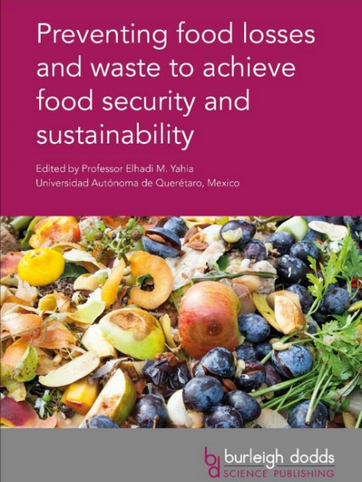Book on preventing food losses with contribution from the Intelligent Container
Temperature deviations as cause for food losses
Chapter by our project:
Jedermann, R.; Praeger, U.; Geyer, M.; Lang, W.:
Temperature deviations during transport as a cause for food losses.
In:
![]() Yahia, E., (ed.):
Preventing food losses and waste to achieve food security and sustainability,
Yahia, E., (ed.):
Preventing food losses and waste to achieve food security and sustainability,
![]() Burleigh Dodds, Sawston, UK, 2019.
Burleigh Dodds, Sawston, UK, 2019.
Deviating temperature conditions during distribution processes reduce the quality of food and significantly contribute to global food losses. The effect of careless handling and inadequate processing only become visible much later in the cool chain, making it difficult to quantify the contribution of individual processes. This chapter highlights the importance of transport losses of produce and draws attention to the omnipresence of temperature deviations. The chapter examines methods of shelf-life prediction, as well as the identification, quantification and mitigation of temperature abuse, along with remote monitoring. Finally, the chapter looks ahead to future research trends in this area.
Book Overview
[ Leaflet]
Leaflet]
PREVENTING A GLOBAL FOOD CRISIS
As stated by Dr Charles L. Wilson, Founder and CEO of the World Preservation Center LLC, USA,"World hunger is on the rise for the first time in decades and crop yields are on the decline. With a rapidly exploding world population we are heading toward a disastrous food shortage crisis. Since one-third of the food that we already produce is lost between the time it is harvested and consumed substantially, more of this lost food must be saved to avoid a major global food crisis."
Never has there been a more important time to publish a comprehensive review of this topic and award winning publisher Burleigh Dodds Science Publishing tackles this task in this new book.
Preventing food losses and waste to achieve food security and sustainability provides a comprehensive review of the causes and prevention of food losses and waste at key steps in the supply chain, for different commodities and across particular regions. Chapters review what is currently known about the causes and prevention of food losses and waste (FLW) at different stages in the supply chain, from cultivation, harvesting and storage, through processing and distribution to retail and consumer use. Chapters also discuss FLW for particular commodities, including, cereals and grains, fresh fruit and vegetables, roots and tubers, oilseeds and tubers, meat and dairy products, and fish and seafood products.
The book - consisting of 27 chapters - is divided into five sections:
• Part 1: The problem of food losses and waste
• Part 2: Causes of food losses and waste
• Part 3: Food losses and waste in different commodities
• Part 4: Reducing food losses and waste
• Part 5: Regional case studies
Professor Elhadi M. Yahia, editor of the new title, discusses the importance of food security and waste on a global scale, taking into consideration the current climate. Read a snippet from his blog below, or alternatively, read the full blog here.
"Securing food for humanity has never been easy, and it is safe to say that it has never been accomplished. Mexico, one of the best countries for food production, reports that two people lose their lives every 24 hours from health conditions that have developed as a result of a lack of food."
Professor Elhadi M. Yahia is Professor and Senior Research Scientist at the Autonomous University of Querétaro, Mexico. He is also a Courtesy Professor at the University of Florida, USA. Prof. Yahia has published 20 books in 3 languages and more than 300 book chapters and articles on post-harvest handling of fresh produce. He has worked at the Food and Agriculture Organization of the United Nations (FAO) where he helped launch the Global Initiative on Food Loss and Waste Reduction.







